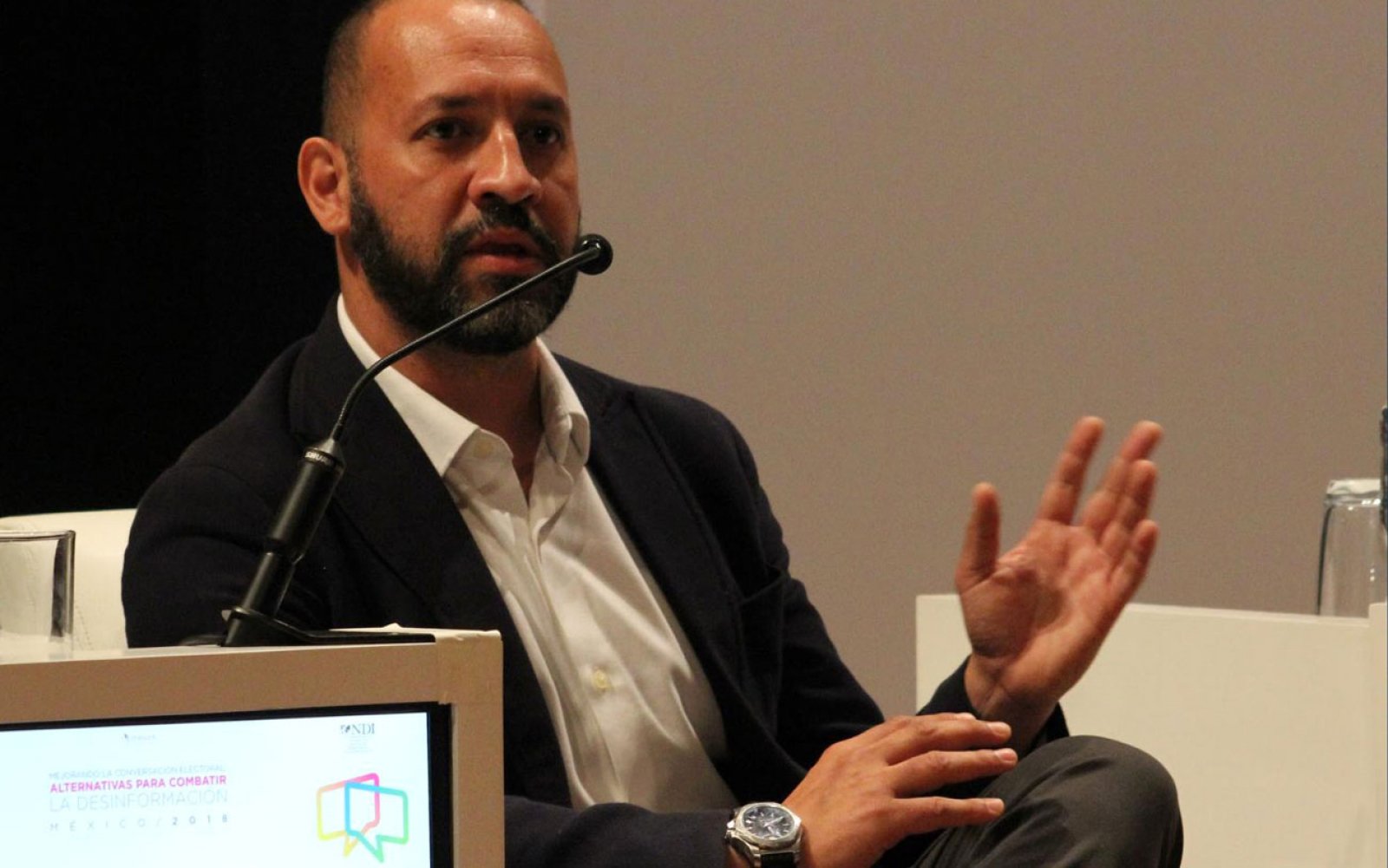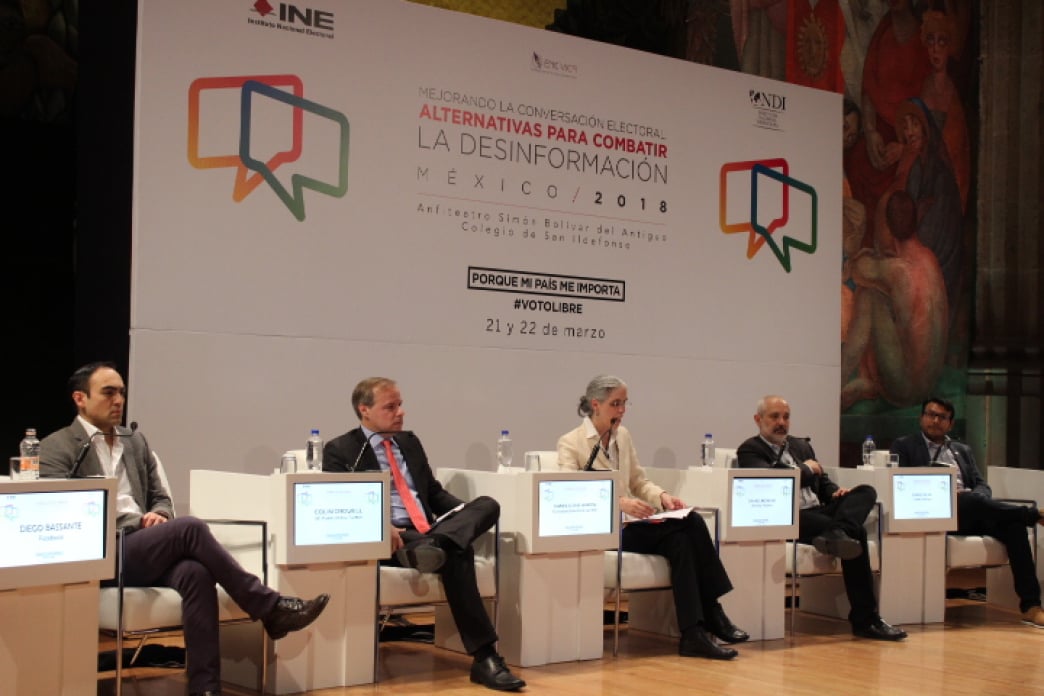
Gonzalo Navarro, General Director of the Internet Association of Latin America (Asociación Latinoamericana de Internet, ALAI)
SHARE
Improving Electoral Conversation: Alternatives to combat disinformation

As Mexico prepares for general elections in July, NDI and Mexico’s National Electoral Institute (INE) – the independent government body responsible for organizing Mexico’s federal elections – co-organized a conference in Mexico City to discuss ways to counter the influence of disinformation. Tech companies, political leaders, civic activists, media associations and academics came together on March 22 to discuss ways to improve the quality of the national conversation.
Social media platforms have enabled the rapid and cheap sharing of virtually every type of media content across massive networks. The speed at which information can now spread was inconceivable just a decade ago. Governments, watchdog groups and even the social media platforms themselves have struggled to keep pace as nefarious actors seek to exploit these platforms for their own advantage. The solution will require a coordinated and long-term response.
"The issue of false news is a problem that we have to solve together. We all aspire to the same thing: having a society that participates and that does so in an informed manner,” said Luis de Uriarte, Facebook’s strategic partner manager for news in the northern Latin America region, during the forum.
Dirty information is like dirty money – it corrupts elections and subverts democracy. The integrity of elections depends largely on the integrity of information.
-- Patrick Merloe, NDI senior associate and director for election programs
Increasingly, both foreign governments and organized non-state actors have employed coordinated campaigns aimed at injecting divisive and controversial narratives into the online conversations. These campaigns exploit points of tension within communities and societies with sensational or false information with the goal of eroding confidence in the institutions of democracy. Among academics, this phenomenon is known as disinformation – the deliberate spreading of false and misleading information to cause harm.
“Dirty information is like dirty money – it corrupts elections and subverts democracy,” said Patrick Merloe, NDI senior associate and director for election programs, at the forum. “The integrity of elections depends largely on the integrity of information.”
The conference, titled “Improving Electoral Conversation: Alternatives to combat disinformation,” took place in the wake of reports that Russia may already be gearing up to launch a campaign of “subversion, disinformation and propaganda” in an effort to sway the the Mexican election. Mexico also has a well-documented history of homegrown attempts to manipulate the online information space and the high-stakes of the upcoming election, which will see over 3,000 seats contested at the presidential, legislative, and local level, compounds this mounting threat.
"It is important that…citizens have a space where they can formulate their opinions, their concerns and also their ideas, and that space remain free,” said Adriana Favela, INE council member. “But one thing is freedom of expression, the freedom with which we each have to express our opinions and generate a public debate, and another thing is to create false news."
"The INE is committed to strengthening the freedoms of Mexicans, without ignoring the phenomenon of disinformation that puts at risk the quality and truthful information that should prevail in the public debate of any democratic system," said INE Council Member Marcos Baños at the conclusion of the forum.
Participants agreed that increased digital and media literacy efforts should be promoted ahead of the July 1 elections. The INE is also taking concerted steps to work with the media and technology platforms to ensure accurate information about the election process reaches voters. Watchdog organizations are also strategizing how to best counter disinformation in the electoral environment while promoting freedom of expression and journalistic integrity.
NDI organized a follow-up discussion with civil society organizations on March 23, which focused on specific ways that election observation groups and civic-tech groups can collaborate to address disinformation around Mexico’s 2018 elections. Both sets of groups identified ways in which the others could help complement their work, and NDI agreed to facilitate further communication and collaboration.
Participants at the March 21 conference included INE staff and counselors; representatives from Twitter, Facebook, and Google; the Internet Association of Latin America (Asociación Latinoamericana de Internet, ALAI); Mexican media like Etcétera, Nation 321 (Nación 321), Nexos, and Huffington Post Mexico; journalist associations and civic tech organizations like Animal Political, Article 19, Horizontal MX and Social Tic; academics from Iberoamerican University (Universidad Iberoamericana, UIA), Monterrey Institute of Technology and Higher Education (Instituto Tecnológico y de Estudios Superiores de Monterrey, ITESM), and Center for Research and Teaching in Economics (Centro de Investigación y Docencia en Económicas, CIDE); as well as international experts from NDI, the Institute for the Future, and Center for Research, Transparency and Accountability, CRTA.


